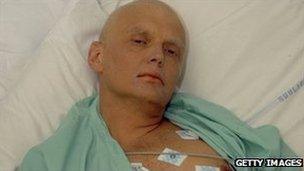Litvinenko public inquiry blocked by government
- Published

Alexander Litvinenko fell ill after a meeting with former KGB contacts in London in 2006
The government has refused a request to hold a public inquiry into the death of ex-KGB spy Alexander Litvinenko, the coroner has announced.
Mr Litvinenko was poisoned with radioactive polonium in London in 2006.
Coroner Sir Robert Owen had requested an inquiry after ruling the inquest could not hear evidence of alleged Russian state involvement.
But a UK government spokesman said the inquest would be an effective investigation into the death.
The Litvinenko family has called for a judicial review of the refusal, saying it showed "utter contempt".
The former spy's widow, Marina, said she was "frustrated" and "surprised" by the decision, which had been handled in an "impolite and rude" way.
But she added: "I'm optimistic, now so many people are involved in this case. More and more people want to know the truth."
The coroner said the inquest would now be further delayed, and expressed his sympathy for Mrs Litvinenko.
'Irrationality'
At the request of the government, Sir Robert previously agreed to exclude certain material from the inquest on the grounds its disclosure could be damaging to national security.
However, this meant the inquest would be unable to look at whether the Russian state was behind the killing or whether the British state could have done more to protect Mr Litvinenko.
To tackle this, Sir Robert wrote to the justice secretary last month to request a public inquiry instead of an inquest, as the inquiry would allow evidence to be heard in secret.
But Sir Robert told a hearing at the Royal Courts of Justice on Friday that the request had been refused.
Ben Emmerson, QC for the Litvinenko family, said: "The government has shown utter contempt for the position of Mrs Litvinenko and her son."
Mr Emmerson told the hearing that the family wanted a judicial review on the grounds of "irrationality" into the decision not to hold a public inquiry.
Mr Litvinenko, 43, died after he was poisoned while drinking tea with two Russian men, one a former KGB officer, at a London hotel in 2006.
His family believe he was working for MI6 at the time of his death and was killed on the orders of the Kremlin.
'Co-operate fully'
The inquest into Mr Litvinenko's death has already faced major delays because both the UK and Russian governments have been slow to disclose documents.
Police have sought the arrest of two Russian nationals in relation to the death, Andrei Lugovoi and Dmitri Kovtun, both of whom deny any involvement. The Russian authorities have rejected requests to extradite the two men.
After attending the latest hearing Alex Goldfarb, a friend of the Litvinenko family, said: "It's absolutely transparent that the Russian government is behind this murder.
"The evidence has been seen by the coroner and the courts. There's prima facie evidence that the Russian government is behind it.
"There's some sort of collusion behind the scenes with Her Majesty's government and the Kremlin to obstruct justice."
Elena Tsirlina, Mrs Litvinenko's solicitor, said the decision not to hold a public inquiry followed "months of talks between the two governments at the highest level" including discussion between the prime ministers of Russia and the UK.
She said: "What deals have been made behind the scene is difficult to know."
The UK government spokesman said: "We believe that the coroner's inquest can continue to effectively investigate the circumstance of Mr Litvinenko's death and we will continue to co-operate fully with it."
- Published11 June 2013
- Published5 June 2013
- Published18 May 2013
- Published17 May 2013